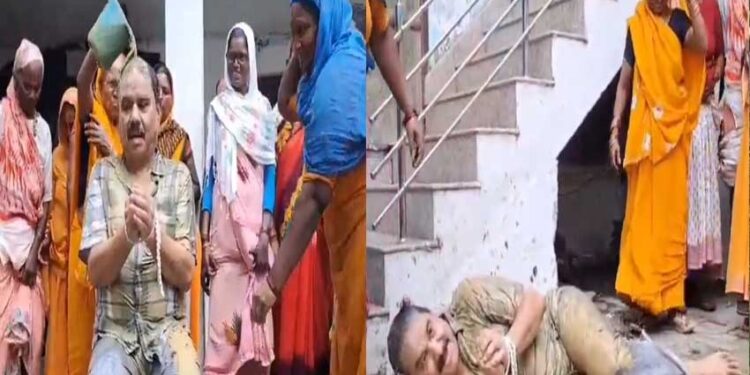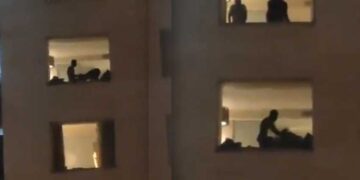Subramania Bharati (English: Subramania Bharati, born: 11 December, 1882 – died: 11 September, 1921) was one of the great poets of India, who composed poetry in the Tamil language. He is also known as Mahakavi Bharathiyar. Bharati was a militant teacher, patriot and a great poet. His patriotic poems are so great that he started being called by the surname Bharati.
The great Tamil poet Subramaniam Bharati was one such writer who was actively involved in the ‘Freedom Movement’, while his works inspired the common people of South India to join the freedom struggle. He was one of such great poets who had a command over many languages like English, Bengali, Sanskrit, English etc., but Tamil was his favourite and sweetest language. He had equal command over both the genres of ‘prose’ and ‘poetry’.
Subramania Bharati was born on 11 December 1882 in a Tamil village Ettiyapuram, Tamil Nadu. From the very beginning, he was a gifted child and in a short time, he acquired a good knowledge of music as well. At the age of 11, he was invited to a conference of poets, where, seeing his talent, Bharati was given the title of Saraswati, the goddess of knowledge. Bharati’s mother died when he was only five years old. Later, his father also died early. He was married at the tender age of 11. At an early age, he came to Varanasi to stay with his aunt, where he was introduced to spiritualism and nationalism. This had a great impact on his life and his thinking changed a lot.
During his four years of stay in Kashi, Bharati studied Sanskrit, English and English. He was particularly influenced by the English poet ‘Shelley’. He also formed an organization called ‘Shellian Guild’ in Ettayapuram and wrote many compositions under the pseudonym ‘Shelidasan’. It was in Kashi that he learnt national consciousness, which later became the main voice of his poetry. In Kashi, he came in contact with ‘Harishchandra Mandal’ formed by Bharatendu Harishchandra. In Kashi, he taught in a school for some time. There he came in contact with Mrs. Dr. Annie Besant, but he did not fully agree with her views. Once he organized Saraswati Puja in his residence ‘Shaiva Math’ under the chairmanship of Mahapandit Sitaram Shastri. In his speech, Bharati stressed on women education, social reform, boycott of foreign goods and development of mother tongue. The chairman protested against it. As a result, a debate started and finally the meeting had to be adjourned.
Later Bharati understood the importance of knowledge and had a keen interest in the field of journalism. During this time he became involved in the publication and editing of several newspapers. These newspapers include the Tamil daily ‘Swadesh Mitram’, the Tamil weekly ‘India’ and the English weekly ‘Bala Bharatam’. He started publishing satirical political cartoons in his newspapers.
Through these letters, not only did he succeed in providing the required knowledge to the people, but his writings were also published. At the same time, his creativity was at its peak. While on one hand his writings contained deep religious matters, on the other hand they also contained information about the Russian and French revolutions. He always worked for the betterment of the deprived sections of society and the poor people.
Bharati participated in the historic Surat Congress of 1907 which made the picture clear between the moderate and extremist groups. Bharati supported the extremist group of Tilak, Aurobindo and other leaders. After this, he got fully involved in writing and political activities. In the year 1908, the owner of India was arrested in Madras and he was to be arrested. To avoid arrest, he went to Pondicherry which was under French rule in those days. Bharati was also associated with the publication and editing of many newspapers in Pondicherry and kept awakening the spirit of patriotism among the people against the British. During his stay in Pondicherry, he was in touch with many prominent leaders of the extremist group. There he also helped Aurobindo in editing Karmayogi and Arya. He also did a lot of work in the field of music. Some of his songs are still very popular in Carnatic music concerts. [1] Bharati had to go to jail for organizing Swarajya Sabha against the British rule. He went to Kolkata and took training in making bombs, firing pistols and guerrilla warfare. He also remained in touch with extremist leader Lokmanya Tilak. Bharati kept Nanasaheb Peshwa hidden in Madras. To escape the eyes of the government, he came to Pondicherry and continued his Swaraj Sadhna from there. He used to help poor students from his income. In 1917, he came in contact with Gandhiji and also participated in the Non-Cooperation Movement of 1920.[2]
Tamil nationalism is mentioned in the early poems of the famous South Indian poet Shri Subramania Bharati, but after coming under the influence of Swami Vivekananda, his poems written in the later part of his life praise Indian Hindu nationalism. He admitted in his autobiography that this change came about because of his guru Sister Nivedita and Swamiji. The spark of thoughts created by Swamiji’s speeches full of patriotism can also be seen on patriots like Veer Savarkar and Lokmanya Bal Gangadhar Tilak. [3]
Bharati’s TitleSubramanya Bharati expressed the sorrow of losing his parents in his poetry. This spread his fame all around. He was honoured in the court of the local feudal lord and was given the title of ‘Bharati’.
Bharati’s favourite song was Bankim Chandra’s ‘Vande Mataram’. In 1905, the famous singer Sarala Devi sang this song in the ‘Congress Session’ held in Kashi. Bharati was also present in that session. Since then, this song became the soul of his life. After returning to Madras, Bharati translated that song into Tamil in the same rhythm, which later echoed in every home of Tamil Nadu.
While Subramania Bharati wrote nearly 400 works of prose and poetry, he also edited Tamil newspapers such as Swadesh Mitram, Chakravartini, India, Suryadayam, Karmayogi and an English weekly called Bal Bharat.[4]
Bharati returned to British India in 1918 and was immediately arrested. He was imprisoned for a few days. Later his health deteriorated and he died on 11 September 1921 in Madras. Bharati lived for less than 40 years and even in this short period he did a lot of work in various fields. The popularity of his works made him immortal.










